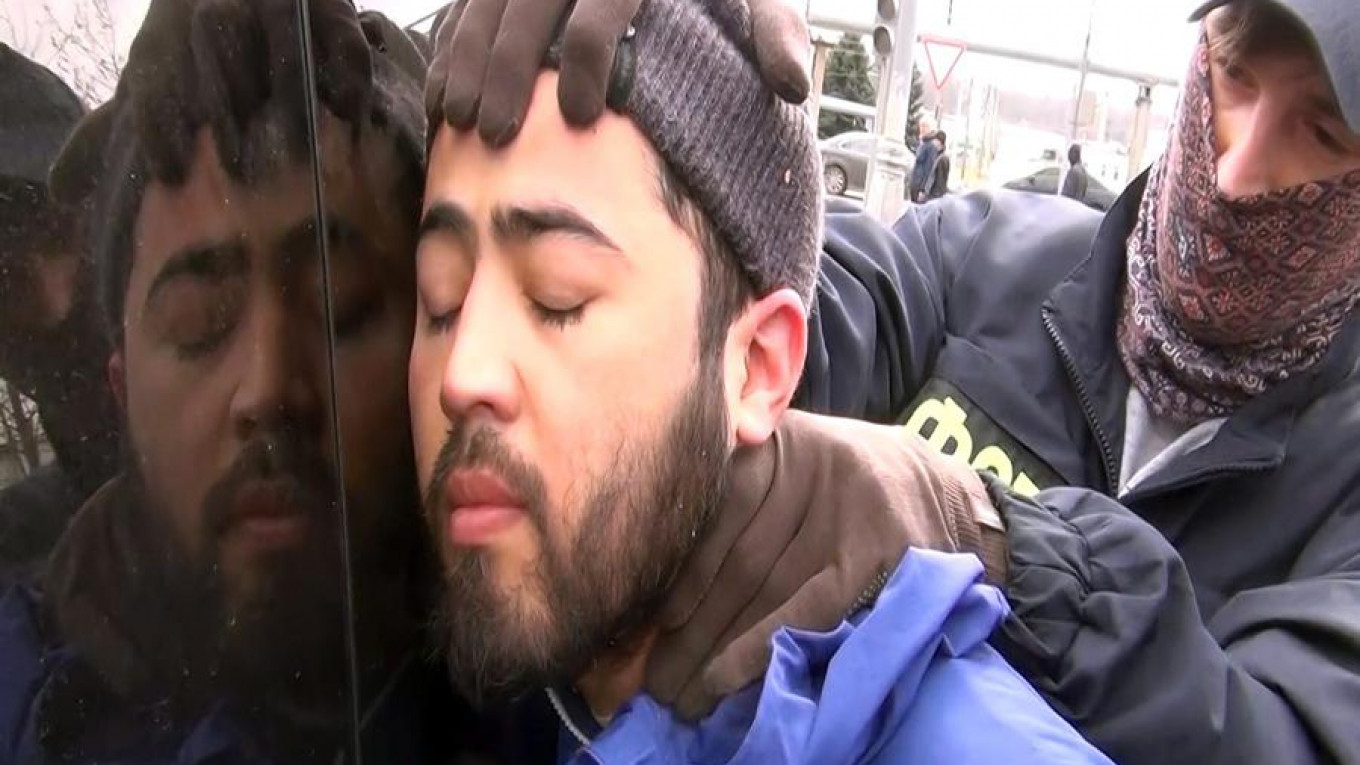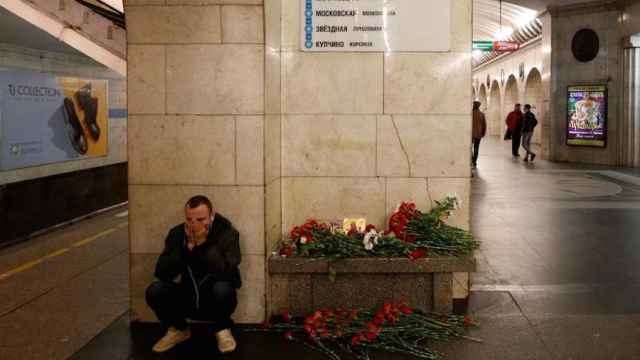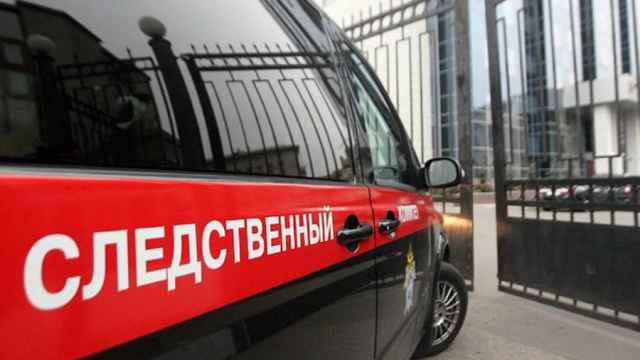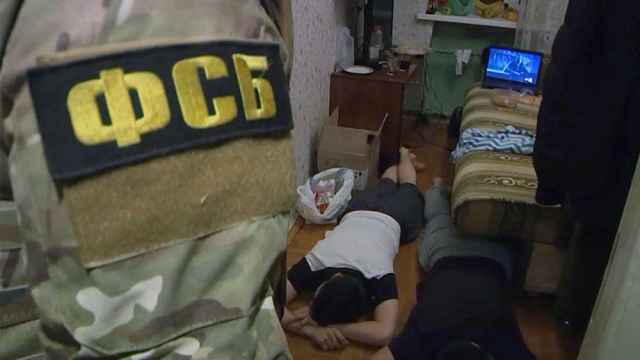Terrorism is back in Russian headlines. In the month since a bomber detonated a homemade explosive device on the St. Petersburg metro, killing 16 people and wounding dozens more, the country has been further shaken by a series of smaller attacks and arrests.
On April 21, a teenager in the Far Eastern city of Khabarovsk robbed a shooting range and then used the stolen weapons to kill two people at a Federal Security Service (FSB) office. Although the Islamic State (IS)* initially claimed responsibility, the attacker later turned out to be a neo-Nazi. Several days later, the FSB detained two supporters of IS in Russia’s remote Sakhalin region. The men were reportedly planning to bomb a place where large numbers of people congregate.
And late last week, security services announced they had arrested 12 Central Asian recruiters from the Islamic Jihad—Dzhamaat Mozhakhedov* movement posing as construction workers in Russia’s western Kaliningrad exclave. The 32-year-old leader of the group reportedly had connections to Syria.
Security analysts caution that it’s too early to establish any trends, but the attacks and arrests raise several concerns. Unlike in past cases, most of the suspects in these recent incidents hail from Central Asia. All operated in cities not previously targeted by terrorists. And several appear to have been so-called “lone wolves” with few direct ties to terror groups.
“Terrorism is becoming more ideas-based,” says Gennady Gudkov, a former parliamentarian who spent over a decade serving in the Soviet and Russian security services. So far, he adds, Russian law enforcement has failed to keep up.
Old and new
Terrorism is far from a new threat in Russia. From the mid-1990s onwards, as Russia battled two wars against separatist forces in Chechnya, the country experienced a series of bloody Islamist terrorist attacks on civilian targets.
In Moscow, terrorists detonated explosives under two apartment buildings in 1999, took a theater full of people hostage in 2002, bombed the Moscow metro twice in 2004, once in 2010, and carried out an attack on Domodedovo International Airport in 2011. Outside Moscow, terrorist attacks were largely confined to the North Caucasus and southern Russia.
Terror remains a constant concern for the Russian authorities, but domestic terrorism has weakened in recent years. Harsh security measures have suppressed fighters in the North Caucasus, and the insurgency there has grown increasingly disunified. With the appearance of IS and other Islamic extremist factions in Syria and Iraq, jihad-inclined residents of the North Caucasus have often departed for the Middle East — sometimes with the assistance of the Russian security services.
Up to four thousand Russian citizens are currently fighting in the armed insurgency in Syria and Iraq, according to a February statement by Russian President Vladimir Putin.
For the last few years, these fighters’ inevitable return has been Moscow’s primary counterterror concern. The authorities particularly worry that the returnees could help unify the fragmented North Caucasus insurgency, says Mark Galeotti, researcher at the Institute of International Relations Prague.
The FSB has dedicated significant resources to countering that threat. Some wonder whether this has come at the expense of other threats like lone wolves and terror emanating from Central Asian diasporas in Russia.
Global trend
In the aftermath of the St. Petersburg attack, Russian police identified the bomber as Akbarzhon Dzhalilov, a 22-year-old Russian citizen born in southern Kyrgyzstan. Dzhalilov had reportedly grown religious over the last three years while working low wage jobs in St. Petersburg, but had never shown outward signs of extremism.
However, on April 25, a largely unknown group called the “Imam Shamil Battalion” claimed responsibility for the St. Petersburg bombing. Dzhalilov, it said in a statement, was acting on the orders of al-Qaeda* leader Ayman al-Zawahri in retaliation for Russia’s actions in Syria, Chechnya and Libya.
That claim sounds suspicious to Alexei Malashenko, a leading Russian expert on Islam and the Middle East. He believes that Dzhalilov was a so-called lone wolf, and stresses that this should not be surprising.
“Recently, we’ve had lone wolves in Stockholm, London, Nice and Berlin,” he says. “In this sense, Russia is experiencing part of a global trend in terrorism.”
That such lone attackers would emerge from the ranks of Central Asian labor migrants is also far from surprising. Migrants in Russia often reside in isolated Central Asian communities, do grueling, low-wage labor and live in substandard housing. They face discrimination from the authorities and sometimes violence from Russian nationalists.
With few opportunities at home and in Russia, the “radical path” can be an escape for labor migrants, says Nikolai Kozhanov, a Middle East analyst and academy associate at Chatham House’s Russia and Eurasia Program. He notes that most of the Central Asians fighting in Syria “were recruited not in Central Asia, but in Russian cities.”
Migrants pose a particular challenge for Russia’s security services. Their social isolation makes infiltrating these communities nearly impossible. Even electronic surveillance is difficult: Migrants frequently share cell phones, and those who don’t likely use secure messenger apps for communication. This forces law enforcement to fall back on so-called passive security—document checks and bag searches.
Migrants’ wide dispersal across Russia also means that a lone terrorist could be more likely to target a provincial city. According to Gudkov, regional branches of the FSB “have been sounding the alarm for 15 years” about the growth of radical Islam outside its traditional centers.
But while the threat of terror emerging from Central Asian diasporas is real, most of the analysts interviewed for this article insisted the bigger threat is still fighters returning from Iraq and Syria. This means the challenge for Russian authorities is essentially multitasking.
Gudkov compares the security services to a surgeon who intervenes during the “acute phase of an illness,” but misses out on the incubation period. He believes authorities must focus on prevention, pushing Muslim leaders to preach against terror and helping them combat extremism.
“You can’t defeat terrorists while they still have the weaponry of ideas,” he says.
* Islamic State, Islamic Jihad—Dzhamaat Modzhakhedov, and al-Qaeda are banned in the Russian Federation.
A Message from The Moscow Times:
Dear readers,
We are facing unprecedented challenges. Russia's Prosecutor General's Office has designated The Moscow Times as an "undesirable" organization, criminalizing our work and putting our staff at risk of prosecution. This follows our earlier unjust labeling as a "foreign agent."
These actions are direct attempts to silence independent journalism in Russia. The authorities claim our work "discredits the decisions of the Russian leadership." We see things differently: we strive to provide accurate, unbiased reporting on Russia.
We, the journalists of The Moscow Times, refuse to be silenced. But to continue our work, we need your help.
Your support, no matter how small, makes a world of difference. If you can, please support us monthly starting from just $2. It's quick to set up, and every contribution makes a significant impact.
By supporting The Moscow Times, you're defending open, independent journalism in the face of repression. Thank you for standing with us.
Remind me later.






